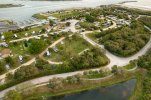I just read an article, in Clearing the Skies: FAA Sheds Light on Local Drone Regulation with Updated Fact Sheet on the new FAA Fact Sheet, https://www.faa.gov/sites/faa.gov/f...n-of-Unmanned-Aircraft-Systems-Fact-Sheet.pdf and was curious if the FAA has resolved any of the overreaching state and local regulations.
For example Florida just updated Florida State 330.41 and included in that statute, Chapter 330 Section 41 - 2023 Florida Statutes - The Florida Senate :
4) PROTECTION OF CRITICAL INFRASTRUCTURE FACILITIES.—
(a) A person may not knowingly or willfully:
1. Operate a drone over a critical infrastructure facility;
It would seem that #1 above is in conflict with the FAA Fact Sheet but, before I get into that, note that Florida has designated some number of ports as critical infrastructure. One port has a beach, a park, two boat ramps, and multiple restaurants.
In the FAA Fact sheet contains the following:
States and local governments may not regulate in the fields of aviation safety or airspace efficiency but generally may regulate outside those fields. A state or local law is preempted if it is aimed at aviation safety or the efficient use of the airspace. But a law seeking to advance other objectives is generally not covered by field preemption unless it impairs the reasonable use by UAS of the airspace.
Using Florida as an example, is the 330.41 statute a violation of FAA or federal sovereignty? Has the FAA actually litigated cases with states over airspace sovereignty? It would seem that the key sentence from the fact sheet, "But a law seeking to advance other objectives is generally not covered by field preemption unless it impairs the reasonable use by UAS of the airspace." might give Florida some leverage because they deemed ports, and other things, critical infrastructure.
P.S. There will be a few responses that will suggest that you go ahead and fly because the FAA owns the airspace. Note that I do not want to be the test case where Florida and the FAA sort out their differences while I am paying lawyers to stay out of jail.
CC'ing @Vic Moss
For example Florida just updated Florida State 330.41 and included in that statute, Chapter 330 Section 41 - 2023 Florida Statutes - The Florida Senate :
4) PROTECTION OF CRITICAL INFRASTRUCTURE FACILITIES.—
(a) A person may not knowingly or willfully:
1. Operate a drone over a critical infrastructure facility;
It would seem that #1 above is in conflict with the FAA Fact Sheet but, before I get into that, note that Florida has designated some number of ports as critical infrastructure. One port has a beach, a park, two boat ramps, and multiple restaurants.
In the FAA Fact sheet contains the following:
States and local governments may not regulate in the fields of aviation safety or airspace efficiency but generally may regulate outside those fields. A state or local law is preempted if it is aimed at aviation safety or the efficient use of the airspace. But a law seeking to advance other objectives is generally not covered by field preemption unless it impairs the reasonable use by UAS of the airspace.
Using Florida as an example, is the 330.41 statute a violation of FAA or federal sovereignty? Has the FAA actually litigated cases with states over airspace sovereignty? It would seem that the key sentence from the fact sheet, "But a law seeking to advance other objectives is generally not covered by field preemption unless it impairs the reasonable use by UAS of the airspace." might give Florida some leverage because they deemed ports, and other things, critical infrastructure.
P.S. There will be a few responses that will suggest that you go ahead and fly because the FAA owns the airspace. Note that I do not want to be the test case where Florida and the FAA sort out their differences while I am paying lawyers to stay out of jail.
CC'ing @Vic Moss










